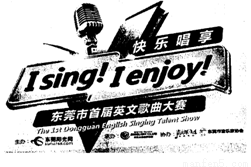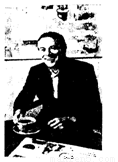假如你是校报英文版编辑,要发一篇关于“东莞市首届英文歌大赛”报名通知,内容包括:

报名时间 | 3月10日――5月10日 |
参赛人员 | 在东莞工作、生活、学习的英语爱好者、外籍人士等; |
上传材料 | 30秒的个人介绍 |
活动意义 | 提高英语学习兴趣、结识新朋友 |
参考词汇:报名sign up 上传upload
注意:1. 词数100左右;
2.可以适当增加细节,以使行文连贯;
3. 开头和结尾已给出,但不计入总词数;
4.文中不能出现真实校名或姓名。
[评分评准]
句子结构准确,信息内容完整,篇章结构连贯。
Notice
Hello, everybody!
The 1st Dongguan English Singing Talent Show is going to be held. __________________________________
____________________________________________________________________________________________
____________________________________________________________________________________________
____________________________________________________________________________________________
____________________________________________________________________________________________
____________________________________________________________________________________________
________________________________________________________________________
Thank you
Editor Li
